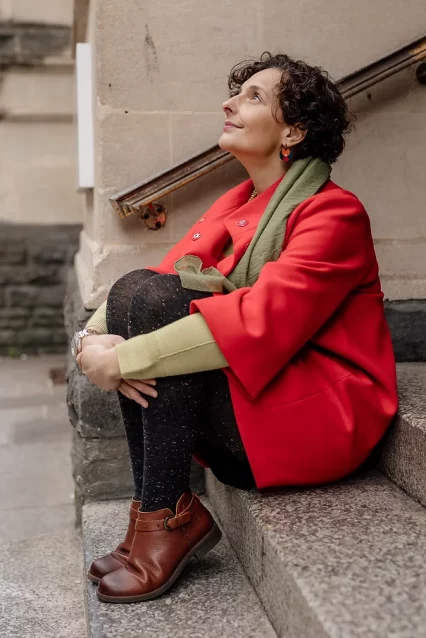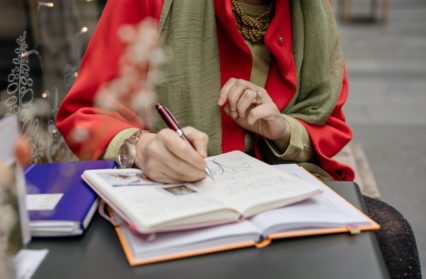With growing numbers of Ukrainian refugees fleeing their home country, Sophie Buchaillard recalls the complexities, misconceptions and life-long challenges presented by her own position as a migrant in Wales.
The radio is reporting on the lack of progress faced by thousands of Ukrainian mothers and children seeking refuge in the UK. In our kitchen in Penarth, my eleven-year-old son is eating his breakfast cereal in silence. “How do you think you’d feel about being forced to leave your home like that?” I ask him. He looks up from his bowl and stares at the wall for a moment. “Very sad. I’d be very sad to leave everything and everyone I know behind,” he replies. I nod. “Of course,” he adds, “It would be easy for you.” A little taken aback, I ask him what he means. “Well, moving is easy for you. You’ve done it so many times.”

My son’s statement makes me feel uneasy. I realise that what he is considering is the trajectory those families are making from a place of danger that until recently contained the small routines of life. That is after all what the radio is reporting on. To him, the challenge is the journey, traversing Europe, the uncertainty of where they might land. In his mind, once those mothers and children arrive in the UK, all will be well. They will be like we are, a mother and child eating breakfast. Moving is easy for you. Through his statement, I fear maybe I made a mistake. I gave the impression that migration is a vague story arc. I silenced all the steps in between.
The migration story I told my son is banal, so understated in fact I probably never named it as such. I spoke of movement: a simple transfer from one city to another, Paris to Cardiff, as people relocate from Manchester to work. I spoke of opportunity: a bonus post-graduation-year-abroad with a nameless boyfriend. It amused him to hear that, a student in my twenties, I had never even heard of Wales. I was being led, on an organised trip designed to provide a flavour of exoticism, a sort of extended visit, to bolster an otherwise blank CV. A way to delay adulthood I admit. I told him that it was the era of free-movement, a given my generation couldn’t imagine would become a dot on history’s unravelling timeline. He knows I came from Paris, via Bordeaux, and a bunch of other places. That I came to a morsel of land, west of the British Isles, a place like any other.
My son never asks why I didn’t return. To him, it is obvious that my life is here, with him. And it is true that after his birth in 2010, his little hands and feet acted like so many tethers, anchoring me to South Wales. But before that? What was it? Work opportunities? Love? A chance to play-act a travel adventure. I was young, unattached, carefree. Nothing to stop me.
Those are the stories you spin. The versions you tell people when they ask. And people often do. What you don’t tell is that moving is a push, brought on by external circumstances; a reaction to the ghosts we leave behind, disguised as free will. Moving is a lie, a euphemism I continue to use to describe a journey, to pretend my position is fluid. The word, migration, too heavy with baggage. You don’t speak of the assessment meeting to gain National Insurance. Of the way the administrative officer addressed you in that tiny grey room, of his innuendos, his wandering hands. You gloss over what happened after the student year, when your residency status excluded you from accessing state support, when you lost your job, your house, when you slept on a park bench for six months. You silence the confusion you felt, and continue to feel, faced with a myriad of things for which you lack the proper context, reminded you are an outsider, over and over again. You smother the fury you felt when, confronting the midwife who had carried out tests you’d declined, her defence was that ‘you foreigners don’t know what’s best for your babies’. You hide the sadness, when your son refuses to learn French, as if it was you whom he rejected. You repress the sense of injustice, when taking the absurd Citizenship Test after twenty years in the UK, the guidebook diligently reminds you that to be a good migrant you ought to take the rubbish out on the correct day and smile at your neighbours.
*
At the start of the millennium, a group of eleven prominent French travel writers attempted to re-define travel literature in two manifestos. They wrote of wandering-literature first, expanding the definition to a more universal ‘world-literature’. Strangely, in their re-definition, they include a list of those whose story they feel cannot be classed as travel writing. The experience of migration, they write, cannot be captured by travel literature since its protagonist have been thrown into movement, often brutally. A journey beyond their control, that ends when they reach their destination. End of story. There is much to decry about such a reductionist view, especially when it originates from a group of white men, but listening to the radio, I realise that it is part of a broader perception, the illusion that for migrants, even more so refugees, the end point is the shore of the host country. Of course, nothing could be further from the truth. Migration is not a hero’s journey to a place of safety. The way policies have defined it, migration is a label stamped on one’s forehead once we have reached the shore; migration is the silent experience that perdures, spilling onto the next generation. What the reductionist perception obfuscates, is the less exotic narrative of daily life that comes after, played out in administrative offices, GP surgeries, schools, shopping centres and playgrounds; in the slightly raised voice, the slowing down of speech, and the ‘where did you come from?’, repeated like a litany. It is the slow and inexorable gap that will grow between a mother filled with another language and her place of origin, and a child, malleable, porous like a sponge, adopted into this new culture. For the mother, it is an exercise in self-censorship, in constantly letting go. If moving was simply the capacity to change place, then yes practice would give an unfair advantage. But migration is not an event. It is a lifelong sentence, governed by strong contradicting emotions. Moving. Emotionally displaced.
Victor Segalen wrote about journeying between cultures. The one we carry with us. The other we are confronted with. He argued for a sort of exoticism in reverse on approaching the shore. The eye of the migrant casts a perspective that amplifies the good and the bad. In this uncomfortable space, the migrant reflects our society back to us. The question becomes whose self is fragmented? Unstable? That of the other or our own?
These people glimpse for the first time ever the aberrant being I am in their midst. I feel that I am being watched without being laughed at, stripped naked…I feel myself becoming an object of mystery.
In the face of news from Ukraine, my experience feels inconsequential. Why write this here and now? Because I would do my son a disservice if he grew up believing that moving is easy. Because when we feel utterly powerless, is the time when we hear better, see better. Because maybe now is the time for us to show empathy, understanding and to look at ourselves anew.
*
In 2024, I will have lived in Wales longer than anywhere else. I am British by passport, French by origin, the mother of a little boy born in Cardiff, whose second language is Welsh. Forever, our accents betray our differences. Yet together, we are a family.
Sophie Buchaillard is a Franco-British author and co-host of the Writers on Reading podcast. Her debut novel, This is Not Who We Are which will be published by Seren in June 2022, is about the Rwandan genocide in 1994 and the affect it has on the lives of two women, one French and one Rwandan, who both migrate to London. You can find Sophie Buchaillard on Twitter, Instagram and via her website.



 Enjoyed this article? Support our writers directly by buying them a coffee and clicking this link.
Enjoyed this article? Support our writers directly by buying them a coffee and clicking this link.







